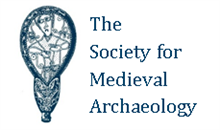Cultures of Cloth: The Archaeology of Textiles in Medieval Northwest Europe is the Annual Conference of the Society for Medieval Archaeology
This event has now been postponed to a future date (tbc). Please consult the Society for Medieval Archaeology website for more information.
Is this for you?
Networks of textile production, exchange and consumption drew together medieval communities across Europe and beyond. The north-western European zone of textile manufacture and trade, however, was particularly significant. It connected farmers, craftspeople and merchants across the North Sea and English Channel
This conference will explore the multifaceted evidence for the ways in which ‘cultures of cloth’ drove medieval society and wove the fabric of medieval life. It aims to bring together scholars from both sides of the channel, across the fields of archaeology and allied disciplines, covering both earlier and later medieval periods in Northwest Europe.
Conference background
Interest in medieval textiles amongst social and economic historians has been growing, while archaeology provides unique data and new perspectives. Textiles only rarely survive in the ground, but permeate all aspects of the medieval archaeological record. Specific areas include:
- The production of raw materials
- The development of manufacturing processes
- The growth of international trade
- The use of textiles in ritual and everyday life
- The impact of new wealth on the physical fabric of the medieval world
Archaeological evidence for medieval textiles therefore encompasses sheep cotes, deserted villages and retting ponds; seeds, sheep bones and DNA; fulling mills, guildhalls, merchant’s houses and churches; seals, loom weights and spindle whorls; clothing, brooches and dress-pins; shroud-pins and funerary effigies; chantry chapels and stained glass windows.
Textile history
Textiles were the single most important manufactured product in the medieval world. Moving from domestic household production to the commercialisation of the textile industry was a primary driver of the development of the medieval European economy and helped to shape medieval landscapes and settlements ranging from rural villages to international cities.
Textiles were one of the most prominent commodities in medieval trade networks. Wool and linen were the stuff of everyday life while silks, damasks and cloth of gold were among the most valuable luxuries in the medieval world. Textiles were used as clothes, bedding, tablecloths, wall-hangings, sails, sacks, altar-cloths and shrouds;. They were integral to every aspect of the routine and ritual lives of medieval people, through which they expressed identities based on geography, status, gender, age and ethnicity.
For better or for worse, spreading disease and depopulation as well as wealth, opportunities and knowledge, cloth production and trade inter-connected communities of all sizes across Europe, surviving and driving a millennium of profound social, economic, political and environmental change.
Contact the organiser
Chris King
Conference Essentials
This event has now been postponed to a future date (tbc). Please consult the Society for Medieval Archaeology website for more information.
Travel and Accommodation
Directions Accommodation Location map (PDF)
The Society for Medieval Archaeology
 The Society for Medieval Archaeology exists to further the study of the physical remains of the medieval period, whether standing buildings, landscapes, buried remains or artefacts in museums.
The Society for Medieval Archaeology exists to further the study of the physical remains of the medieval period, whether standing buildings, landscapes, buried remains or artefacts in museums.
The society publishes a highly regarded journal, Medieval Archaeology, and holds regular meetings and conferences bringing together a wide range of disciplines to explore and develop current and emerging research themes.
Membership of the Society is open to all those interested in medieval archaeology and members receive two issues of the journal and two issues of the society Newsletter per annum. Members are also entitled to discounted rates for conferences and monographs, while a number of other institutions also offer special discounts to society members.